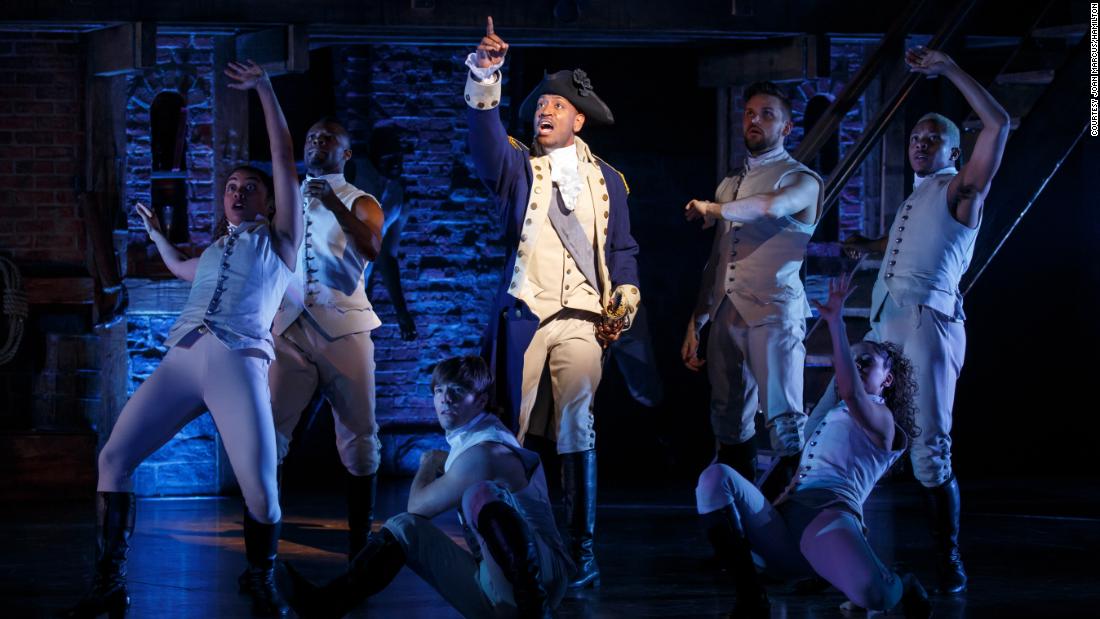This is the new trailer for the musical "Hamilton" 0:50
Editor's Note: Ed Morales is a journalist and professor at the Center for Ethnicity and Race Studies at Columbia University and at CUNY's Craig Newmark Graduate School of Journalism. He is the author of the book "Fantasy Island: colonialism, exploitation and treason of Puerto Rico". Follow him on Twitter @SpanglishKid. The opinions expressed are those of the author. See more opinion articles on CNNe.com/opinion.
(CNN) - This weekend of July 4, which found much of the United States reeling after a rocky first half of 2020, the buzz on major social media can be summed up in three words: "Hamilton" is back. The play has won 11 Tony Awards and a Pulitzer Prize for drama and, according to Forbes, has generated more than $ 1 billion in revenue from ticket sales on Broadway, London and on the US tour, for publications, recordings of casting and product sales. A filmed version was released on Friday on the Disney + streaming service.
But he clearly landed on a different stage from 2015, when "Hamilton" premiered on Broadway. What Lauren Michele Jackson, writing in the New Yorker , calls the play's "fair and multicultural patriotism" now seems to be at odds with Black Lives Matter's (BLM) strident call for radical change in a United States where the legacy of white supremacy endures. In addition to demanding that the police end violence against blacks, many protesters have focused on removing or overthrowing various statues and monuments of Confederate leaders, as well as Andrew Jackson, Teddy Roosevelt, Christopher Columbus, and even one of Abraham Lincoln, due to its symbolism.
Some eyebrows were raised when "Hamilton" creator and lead actor Lin-Manuel Miranda and producer Jeffrey Seller admitted in late May that they were guilty of "moral failure" for not talking about the George Floyd protests. Last week, in a profile published in the Wall Street Journal , Miranda's father, Democratic political consultant Luis Miranda, spoke vaguely of having contacted Black Lives Matter leaders "to begin a dialogue" about how Hamilton and his " family ”can work together with them.
But while there has been at least one report on the use of a quote from "Hamilton," "History is Watching," at a BLM protest, to reevaluate "Hamilton" now is to notice a crucial incompatibility with our current moment: its hero. and its message is essentially ambivalent, while America's current policy on racial sins requires a firm stance. In fact, "Hamilton" is a minefield of ambivalent messages: Is our conclusion about his main character that he is a revolutionary hero or an imperfect philanthropist? Is their nontraditional cast strategy a triumph that allows people of color to “stand up” or are they undermined by the irony of how their incarnation as founding fathers ignores the fact that most of the characters they play were slave owners ?
"Hamilton" was the perfect play for the Obama era because it fueled the departure of Democratic liberalism from heroes like Thomas Jefferson, who portrayed a figure of robust pastoral individualism, to Hamilton, the banker's master financial planner. Miranda creates "Hamilton" as an immigrant "who does the job," a stranger. But Hamilton did not, in fact, face any of the discrimination against immigrants for which he is modeled: for example, his elite education at Kings College in New York was paid for by a business firm on his Caribbean island of St. Croix who had some dealings with the slave trade.
Hamilton's curious ambivalence - he had married a member of a slave family, believed that the "natural powers of blacks were probably as good" as those of whites, believed in a monarchical version of democracy - is not revealed in the work. Although he believed slavery was objectionable, he compromised that belief to protect property rights. It was this kind of compromise that created an appearance of national unity, but buried the issue in a myth of American creation that still haunts us today.
Hamilton's ambivalence in the play is camouflaged by the love story at its center that also seems to be at the heart of its appeal. First, his romance with Elizabeth Schuyler distracts our attention from the fact that the Schuylers were one of the largest and most notorious slave families in New York State. The name is so outrageous that the mayor of Albany last month ordered the removal of a statue honoring Phillip Schuyler, Hamilton's father-in-law.
A bit of similar camouflage takes place in the scene where Hamilton has an extramarital affair with Maria Reynolds. The distraction by his betrayal occurs while he is engaged in debates over the ratification of the Constitution. The story centers on his desire to create a central bank to take on all debts: at one point he mocks Jefferson saying "your debts are paid because you don't pay for labor ... so we have Congress taken hostage by the South". But the drama about Reynolds overlooks her failure to speak out against the three-fifths compromise, allowing southern states to count blacks as three-fifths of a person for representation purposes.
While the play "Hamilton" has certainly acted as a positive vehicle for the exposure and success of people of color on Broadway, their subversive roles as white founders effectively wipe out 14% of the late 18th-century black residents who were mostly enslaved in New York and for whom such flaunted positions were unimaginable.
It could be argued that "Hamilton" does not seek to fundamentally alter society with his version of the Revolution, especially since the values and triumphs he celebrates stem entirely from founding fathers who primarily did not view people of color as human.
The success of "Hamilton" is especially surprising because it premiered on Broadway about a year after "Holler If Ya Hear Me," a play based on the life of Tupac Shakur, one of hip-hop's most authentically political figures, fail miserably. The “Hamilton” triumph could be seen as evidence that the Broadway audience was not so much looking for a hip-hop musical itself, but a version of hip-hop that privileged a white liberal audience by allowing it to embrace blackness in its own terms, while including enough lyricism and the Obama era hope of embracing aspiring people of color, some of which are also reflected in this play.
#HamilFilm is trending on Twitter, probably reflecting how the high price and limited availability of tickets make most people see it for the first time now. Along with the widespread devotion of his followers, there is some intense criticism, fueling Ishmael Reed's work "The Haunting of Lin-Manuel Miranda" and Reed's own claim of how the iconic novelist Toni Morrison helped fund it. Last year, Hamilton had a mixed reception when it was held in Puerto Rico, Miranda's ancestral homeland, due to his initial support for congressional legislation that imposed a fiscal oversight board on the island. And a Latino advocacy group called "Somos Presentes" collected signatures for a letter asking Disney to "stop celebrating and take advantage of slave trader Alexander Hamilton." (Although it is unclear if Hamilton ever had slaves, there is evidence in his documents that he participated in slave transactions on behalf of the Schuyler family.)
The movie "Hamilton," will undoubtedly appeal to a large audience, and may change the way the United States, outside of the cities where "Hamilton" has been featured for years, thinks of Broadway theater because of the way Miranda fuses hip-hop with blues love songs, making Hamilton a great storyteller in love with his revolution and the mother of his newborn. As things stand now, with covid-19 seriously threatening the economy (and disproportionately affecting blacks and brunettes) and with an image of the United States of President Donald Trump as an unstable socio-political disaster, much of its audience will inevitably see work in a different light.
In the context of a movement that has clearly identified systemic racism and deadly surveillance as elements to abolish rather than reform, "Hamilton" is picturesque and uncompromising. HamilFilm has come at a time when the United States is not satisfied with ambivalence or commitment, but yearns for real and necessary change.
DisneyHamilton








/cloudfront-eu-central-1.images.arcpublishing.com/prisa/KMEYMJKESBAZBE4MRBAM4TGHIQ.jpg)


